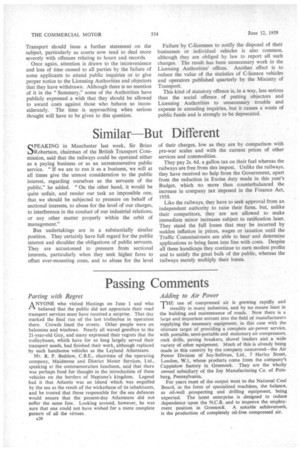Similar But Different
Page 22

If you've noticed an error in this article please click here to report it so we can fix it.
SPEAKING in Manchester last week, Sir Brian Robertson, chairman of the British Transport Commission, said that the railways could be operated either as a paying business or as an unremunerative public service. "If we are to run it as a business, we will at all times give the utmost consideration to the public interest, regarding ourselves as the servants of the public," he added. "On the other hand, it would be quite unfair, and render our task an impossible one, that we should be subjected to pressure on behalf of sectional interests, to abuse for the level of our charges, to interference in the conduct of our industrial relations, or any other matter properly within the orbit of management."
Bus undertakings are in a substantially similar position. They certainly have full regard for the public interest and shoulder the obligations of public servants. They are accustomed to pressure from sectional interests, particularly when they seek higher fares to offset ever-mounting costs, and to abuse for the level of their charges, low as they are by comparison with pre-war scales and with the current prices of other services and commodities.
They pay 2s. 6d. a gallon tax on their fuel whereas the railways are free from this impost. Unlike the railways, they have received no help from the Government, apart from the reduction in Excise duty made in this year's Budget, which no more than counterbalanced the increase in company tax imposed in the Finance Act, 1958.
Like the railways, they have to seek approval from an independent authority to raise their fares, but, unlike their competitors, they are not allowed to make immediate minor increases subject to ratification later. They stand the full losses that may be incurred by sudden inflation in prices, wages or taxation until the Traffic Commissioners are able to hear and determine applications to bring fares into line with costs. Despite all these handicaps they continue to earn modest profits and to satisfy the great bulk of the public, whereas the railways merely multiply their losses.




















































































